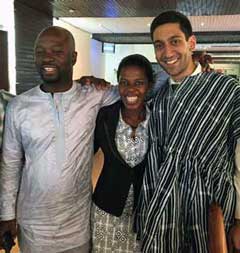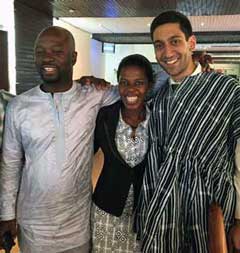 KINGSTON, R.I. – August 19, 2015 – University of Rhode Island graduate student Daven Amin says he likes the idea of integrating technology in novel places. This summer he did just that, spending two months in Ghana creating an electronic survey of poor fishermen as part of a sustainable fisheries management project being implemented in the African nation.
KINGSTON, R.I. – August 19, 2015 – University of Rhode Island graduate student Daven Amin says he likes the idea of integrating technology in novel places. This summer he did just that, spending two months in Ghana creating an electronic survey of poor fishermen as part of a sustainable fisheries management project being implemented in the African nation.
The Red Hook, N.Y., native spent long hours creating the survey in the Ghanaian offices of the URI Coastal Resources Center, which received a $24 million grant last year from the U.S. Agency for International Development to create and implement the program over the next five years. Amin then conducted field tests of the survey using Android tablets and helped train local staff to administer it.
“Fish make up 60 percent of the animal protein in the Ghanaian diet, but the fishery there is poorly regulated and on the verge of collapse,” said Amin, who will earn graduate degrees from URI in computer science and statistics in the coming year. “The goal of the program is to rebuild fish stocks, in part through responsible fishing practices, and that involves getting input from the fishermen.”
The Coastal Resources Center has worked with developing nations around the globe for more than three decades to address issues affecting coastal communities, including fisheries management, marine conservation, community planning and climate change mitigation. In Ghana, more than 100,000 men and women involved in the local fishing industry are expected to benefit from its latest project, which includes efforts to reduce illegal child labor and trafficking in the fishery sector and improve the livelihoods of women fish processors.
When the Center turned to the URI statistics department to design the baseline survey and ensure it would be statistically valid, the department called on Amin, whose unique background combining statistics and software development made him the right man for the job.
It wasn’t easy. The unreliable electricity supply in Ghana was the first hurdle.
“It was very common to have 12 hours of electricity and 12 or even 24 hours of no electricity,” Amin said. “It was difficult to come up with the tools to administer an electronic survey in an environment where even charging your phone is a challenge. A lot of the infrastructure I take for granted wasn’t available there.”
The next difficulty came in identifying who should take the survey. Valid surveys typically involve selecting a random sample of the target population, which is usually done based on public records and addresses. But there are no detailed records or addresses in the fishing villages along Ghana’s coastline. So Amin and his Coastal Resources Center colleagues figured out how to use GPS locations rather than home addresses to select the random sample of fishing households for the survey.
“Daven did a terrific job under a tight time schedule and in a difficult operating environment, allowing us to use state-of-the-art information and communications technology for the impact survey,” said Project Director Brian Crawford. “This will help ensure better data quality and in the long term reduce overall costs.”
Home for Amin during his two months in Ghana was an apartment in a working class neighborhood where he bunked with a co-worker. Water was delivered to a tank on the roof, and meals included the Ghanaian staple kenkey, a cooked corn dough, and soups or stews that often included animal parts like liver, intestines and fish heads.
After returning to the U.S. on Aug. 1, Amin felt a new appreciation for paved roads, reliable electricity and tap water. But he also appreciated the experience of working with a team committed to improving the economy and the coastal ecosystem in a developing nation.
Thinking about his career plans after graduation, Amin said he hopes to eventually work on the West Coast, which he describes as “every computer scientist’s dream. But if I had a chance to go back to Africa, I’d do that. It was a cool experience, and there are lots of opportunities there.”
Pictured above: URI student Daven Amin (right) poses in a traditional Ghanaian smock presented to him as a gift upon his departure from the country in July. With him are two co-workers at the URI Coastal Resources Center in Ghana, Hardi Bakari (left) and Patricia Aba Mensah. (Photo provided by Daven Amin.)

